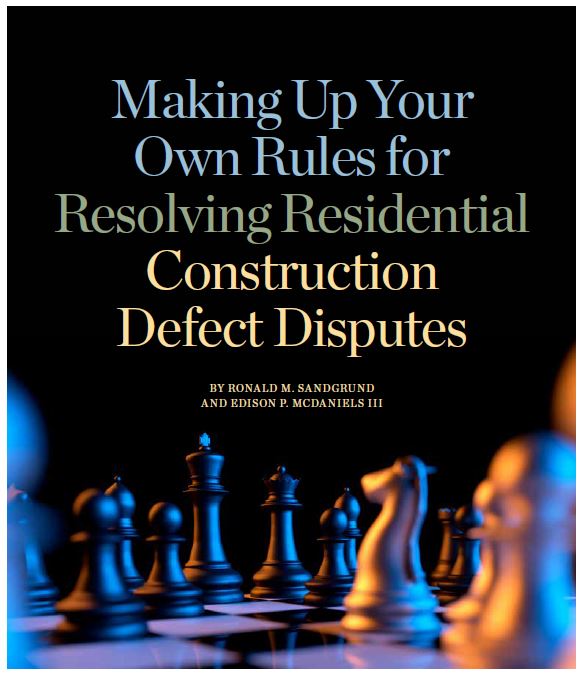Making Up Your Own Rules for Resolving Residential Construction Defect Disputes
| Jurisdiction | Colorado,United States |
| Citation | Vol. 52 No. 4 Pg. 36 |
| Pages | 36 |
| Publication year | 2023 |
FEATURE | CONSTRUCTION LAW

BY RONALD M. SANDGRUND AND EDISON P. MCDANIELS III
This article examines whether Colorado statutes or public policy constrain construction professionals from creating their own rules for resolving residential construction defect claims. It also explores the nature and extent of construction professionals' and homeowners'freedom to contract around these laws.
Construction professionals sometimes include provisions in their residential construction contracts, purchase agreements, and declarations of covenants, conditions, and restrictions (declaration) that are arguably inconsistent with Colorado's Construction Defect Action Reform Act (CDARA), Colorado's Common Interest Ownership Act (CCIOA), Colorado's Revised Uniform Arbitration Act (CRUAA), Colorado's Rules of Evidence (CRE), and/or Colorado construction defect common law.[1] Such provisions may present procedural, substantive, evidentiary, or economic barriers that make a homeowner's or homeowners association's pursuit of construction defect (CD) claims more difficult, expensive, and time-consuming; less likely to result in a negotiated settlement before suit or arbitration is commenced; and, in some cases, less likely to result in a fair consideration of the claim by the arbitral or judicial tribunal.
In these circumstances, the question arises whether some or all of these provisions are void in whole or in part because they conflict with Colorado statutes or public policy. This article describes and analyzes these kinds of provisions. Practitioners should consider whether such provisions, if void, may also violate Colorado's Consumer Protection Act (CCPA).[2]
Framing the Issue
A client tells you that they and their 25 neighbors are each facing the loss of the single largest investment they have ever made—their condominiums—due to significant and widespread structural damage caused by the pressures exerted by underlying expansive soils. They explain that the builder has assured them over the past year that their many progressive drywall cracks and sticky windows are simply cosmetic issues, and that the builder even came in and patched and painted the cracks and adjusted the windows after the one-year warranty expired.
They provide you their boilerplate unit purchase contract and condominium declaration, and two provisions catch your eye. The first is embedded in the declaration's CD arbitration clause and cross-referenced in the purchase contracts. It provides that (1) claims must be specified with particularity as to the location, repair methodology, supporting evidence, and repair costs in advance of any mediation or arbitration proceedings; (2) in any such proceedings, it is rebuttably presumed that any construction done by the builder is not defective, the builder performed its obligations adequately under the contract, and the builder was not negligent, provided the builder's performance was in accordance with any one of certain local trade standards, builder association construction guidelines, or the building code; and (3) in any such proceedings, evidence of repairs made by the builder and evidence of industry advancements or knowledge discovered after the date of the declaration are inadmissible. You view compliance with this language as potentially onerous and unduly expensive, and possibly inconsistent with the statutorily required pre-suit notice of a CD claim and traditional proof of defective construction.
The second provision you flagged is located in the purchase contracts' CD arbitration clause. It says that, in arbitration proceedings, expert testimony offered to establish the builder's breach of any contract, tort, or statutory obligation, or as proof of damages, such as reasonable repair costs, is only allowed if offered through a homebuilder licensed by the building department in the city or county in which the home is located, and who has built and sold at least 10 homes for over $200,000 in the two years before the claim. You wonder whether this provision is enforceable if it is inconsistent with CDARA, CCIOA, CRE, or Colorado's construction defect common law, or otherwise violates Colorado public policy. You question how feasible it is to locate expert witnesses who meet these criteria who would be willing to provide opinions that might criticize the very practices the witnesses have engaged in. And you are curious whether experts would be willing to testify against someone in their industry living and working in the same community, who was perhaps an acquaintance or friend. In fact, you wonder if such potential homebuilding expert witnesses might consider that, without their testimony, there might be fewer, if any, CD claims made, resulting in lower liability insurance premiums for themselves and their colleagues.
Beginning the Analysis
Analyzing the enforceability of contract provisions that impose different or additional conditions to bring and prove a CD claim than those required by law requires measuring the contract language's effect against applicable statutes and cases and determining whether it is consistent with or undermines the policies underlying the law. If the purpose of the law is to create a uniform framework for enforcing rights and claims governed by the law and to create and preserve consistent standards for CD rights and claims, then arguments exist for voiding the contractual language. However, if the purpose of the law is simply to create a general framework for enforcing CD rights and claims yet preserve the right to contractually modify this framework without impairing these rights and claims, then arguments exist for giving effect to the contract language.
If the former analysis prevails, then the tribunal's work may be limited to simply striking the nonconforming provision if it imposes conditions different from or in addition to those imposed by law. If the latter analysis applies, then tribunals must examine and weigh, on a case-by-case basis, the burdens imposed by the contract language in light of the law's amelioratory purposes. Thus, tribunals may adopt a bright-line, balancing, or other test when employing these analyses.
Freedom of Contract and Caveat Emptor (Buyer Beware)
Colorado has a long history of supporting parties' freedom to contract regarding how to allocate risks of loss[3] and employ alternative dispute resolution (ADR) mechanisms, including ADR and decisionmaker-selection procedures.[4] Moreover, for many years, real and personal property purchasers were subject to the rule of caveat emptor—buyer beware.[5] However, Colorado has also historically limited or voided certain

contractual provisions if they serve an illegal purpose, are unconscionable, violate statute, or arise from an unfair take-it-or-leave-it bargaining position, such as with adhesion contracts.[6]Moreover, if someone is fraudulently induced to enter into a contract to their detriment, a court may void some or all of the contract and award money damages.[7] In these cases, generally the burden rests with the party seeking to limit or void the contractual provision to prove these exceptions apply to the typical rule that parties have broad freedom to negotiate and contract on mutually acceptable terms.
Public Policy and Contract Avoidance
Statutes "by their nature are the most reasonable and common sources for defining public policy."[8] When the legislature defines certain persons' rights and responsibilities, contract provisions that "dilute, condition, or limit" matters mandated by statute violate public policy and are generally void and unenforceable.[9] One prominent area where courts have voided or rewritten contract provisions to comport with statutes concerns insurance contracts, which are highly regulated. Based on public policy concerns, courts have struck down clauses in insurance contracts,[10] employment manuals, and lift ticket agreements.[11] In one case, the Colorado Court of Appeals voided construction contract terms shortening the applicable statute of limitations because they contradicted the Homeowner Protection Act (HPA) prohibition against such provisions.[12] In light of the many times Colorado's legislature has enacted laws governing or relating to CD claims,[13] both substantively and procedurally, the question arises whether, when, and if ever a construction professional, developer, or common interest property declarant may impose contract terms that impair homeowner rights or a construction professional's, developer's, or common interest property declarant's obligations.
Residential Construction and Colorado Public Policy
Colorado's courts and legislature have narrowed the general rules of freedom to contract and caveat emptor in home sales, including newly constructed homes, condominiums, and townhomes. Colorado was one of the first states to recognize implied warranties of habitability, workmanlike construction, compliance with applicable building codes, and suitability of purpose arising as a matter of law from a builder-vendor's sale of a new home.[14]
Colorado also imposes a tort duty on residential real estate sellers to disclose latent defects.[15] And Colorado imposes a tort duty of reasonable care in home construction and design, separate and independent from any contractual duties, on builder-vendors, general contractors, and subcontractors, among others. Courts have ascribed this independent tort duty to various factors, including:
■ the home buyer's relative lack of knowledge and sophistication regarding home construction;
■ the home buyer's lack of access to the underlying structural work;
■ the home buyer's inability to detect latent defects that, by their nature, are hidden or slow to manifest;
■ the significant financial risk that a...
To continue reading
Request your trial
